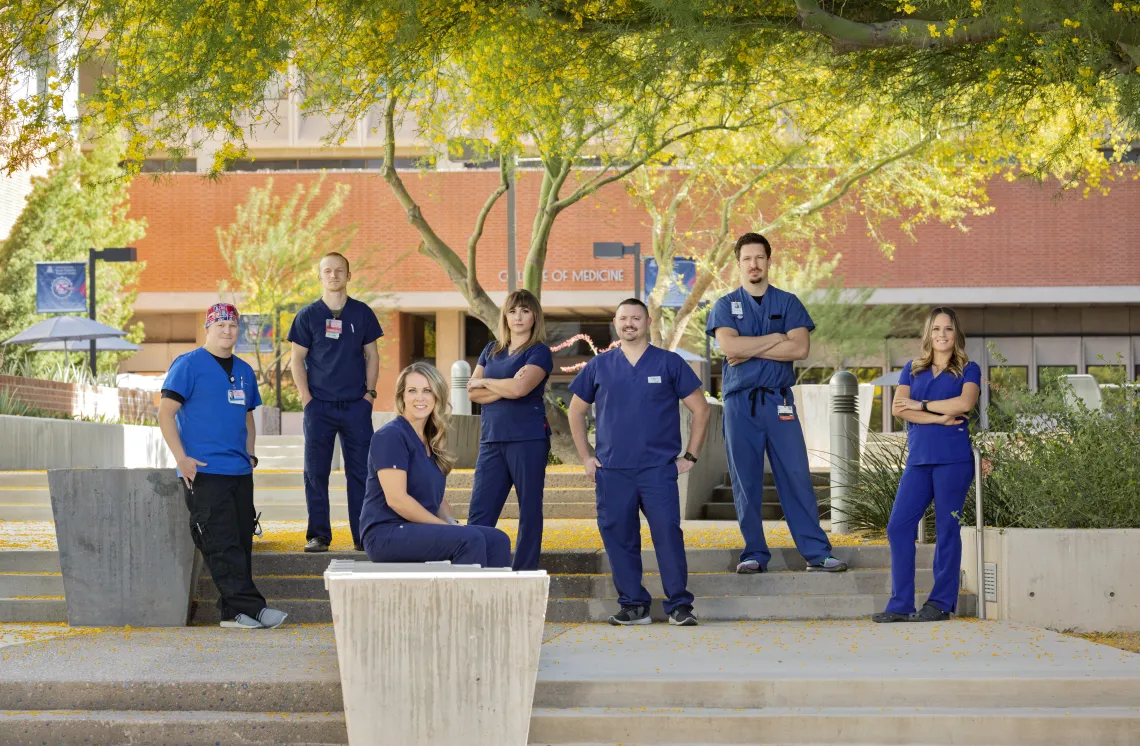Timely Teamwork
Alumni join forces to save lives.

You could say Leslie Wolfe Brown knows a bit about teamwork. Her pitching helped propel the Wildcats to a women’s softball national championship. Later, she played professional ball with the Arizona Heat.
These days, she’s part of a different team, one whose collective effort saves lives. As an emergency room nurse at Banner – University Medical Center Tucson, she’s on the front lines of the coronavirus pandemic.
“I was part of a team at the University of Arizona, and I wanted to be part of another team,” she says. “And I just love the idea of helping people.”
It was June 2006 when the Wildcats scored a 5-0 win over Northwestern University at a roaring stadium in Oklahoma City to win the national title. “That was one of the most memorable moments of our lives,” she says. “We had an amazing group of players. And it was a tough team — no one went down without a fight. The mental toughness, the physical toughness of the team was like none other.”
Except, perhaps, on the front lines, where the ER team is equally committed. “I feel even more proud to be a nurse now than I ever have in my life,” she says. “It’s an amazing team I work with, amazing doctors, and we feel very prepared. When you’re prepared, it takes the fear out of it a little bit.”
That team includes Noah Tolby, a fellow Arizona alumnus and a doctor of emergency medicine. Like others in his department, Tolby admits to being “kind of an adrenaline junkie. You never know what’s going to come through the front door. It’s intense, but really satisfying.”
These days, few things could be more challenging than fighting a deadly contagion — and doing so safely. “With COVID-19, there are a lot of atypical presentations,” Tolby says. In other words, it’s not always easy to tell those who have the disease from those who don’t. “So a big part of being prepared for it is just assuming that everybody does have it,” he says. “We really protect ourselves and protect each other to keep our infections down.
“Everyone has to work together. But COVID is making us really stand out on a daily basis in that regard.”
And the challenges extend beyond medical care and provider safety. Since patients must be isolated from friends and family, nurses and doctors are being tapped to provide an extra personal touch.
“It makes us step up our game as nurses to be there for our patients, not just as nurses but also for emotional support,” Wolfe Brown says. “It brings out a compassionate side of you — a very compassionate, nurturing side of nursing.
Sometimes we forget how important that really is.
“We had a patient in his eighties,” she recalls. “He had [COVID-19], and he got worse. We were able to get a hold of his daughter and use one of our phones to do FaceTime. We put the phones in plastic bags to try to keep them germ-free. I’m holding the cellphone in a plastic bag up to his face, and he can’t talk but at least he can put his eyes on his daughter, and she could lay eyes on her dad and say what she wanted to say to him before things took a turn for the worse.
“That required a lot of work from the physician, from me as a nurse, from our social worker. We all stood around and let them have their conversation, and I let her know that he was in good hands. It was a good feeling.”
Wolfe Brown pauses. “I look at my patients and think ‘If this was my family member — my father, my grandfather — how would I want them to be treated?’” she says.
